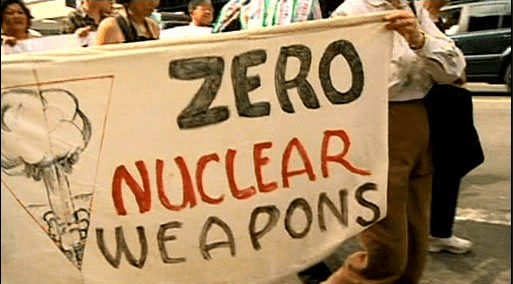It is 72 long years after witnessing the mushroom cloud erupt into a blinding inferno at Hiroshima and Nagasaki. Yet, only now have we finally learned our lesson. In early July, 122 countries helped make history by adopting the nuclear weapons prohibition treaty (NWPT). This treaty prohibits states from developing, testing, producing, manufacturing, acquiring, possessing, stockpiling, transferring, deploying, stationing, using or threatening to use nuclear weapons, under any circumstances.
The Nuclear Non-Proliferation Treaty (NPT) is paramount to disarmament and non-proliferation efforts among signatory states and is essential in crystallising the global norm that nuclear weapons should be prohibited.
The global stockpile of nuclear weapons has declined from 22,600 in 2010 to 15,400 nuclear weapons in 2016. Behind these deceiving numbers lay the woeful reality of the NPT’s exhausted capability to single-handedly lead the world to abolition. You don’t have to be a genius to know that 15,000 is a long way from zero. And, this is more so when the nine nuclear-armed states such as China, India, Pakistan and North Korea are continually modernising their remaining nuclear capabilities.
The NWPT will not be gaining a ‘yes’ from nuclear-armed and nuclear deterrent states. In the words of Daryl Kimball, head of the Arms Control Association, ‘the treaty will not immediately eliminate any nuclear weapons, it can, over time, further delegitimize them and strengthen the legal and political norm against their use’. Well, our very own ANU Vice-Chancellor Professor Brian Schmidt AC thinks the treaty is a good idea. He was one of 15 Nobel Peace Prize Laureates to sign a statement that ‘urged the First Committee and the General Assembly to mandate negotiations on a treaty banning nuclear weapons in 2017’.
International law seems to be a liberalist ideal that realists think is just infeasible. However, this is a huge step towards a nuclear-free society that the international community has gifted us. Now, as the next generation of thought leaders, we must continue to work on it so that it can become a much stronger, more efficient, and less ‘tokenistic’ piece of legislation.
We must emphasise the need for a much stronger legal instrument that is complementary to the NPT. One that clearly resonates the illegality of nuclear weapons to stop countries from exploiting the NPT’s leniency towards countries achieving the ‘cessation of the nuclear arms race’ at the ‘earliest possible date’. Hence, the NWPT was born, but Australia won’t be signing it.
Australia’s stance is that only under an extended nuclear deterrence will we achieve a sense of national safety. Although an A+ student in attending nuclear disarmament and non-proliferation talks, Australia got a solid F from the international community when they boycotted the nuclear weapons ban treaty negotiations.
The Australian government is going outside its normal beliefs in a ‘rules-based international order’. Instead, it is standing by the ‘building block’ or ‘progressive approach’ to ensure a more sustainable solution to abolition. This sounds more attractive than the hastiness of the ambitious ban treaty. However, the problem is not the processes needed to take us to this ‘minimisation point’. The problem is that there is no real incentive to build these blocks. It’s a simple rebranding of the NPT, which is not enough given that multilateral negotiations on disarmament have been stagnant for almost two decades.
We are reportedly in the range of North Korean and Chinese nuclear weapons. Yet, we are choosing the short-term alternative by protecting ourselves with nuclear weapons. Rather, we should be opting for a more sustainable and long-term method to collectively push the norm of nuclear weapons prohibition.
The world continues to live in fear that mass annihilation will occur if modern nuclear weapons are detonated (which are more than 3000 times more destructive than ‘Little Boy’ and ‘Fat Man’). George Wald once said that ‘nuclear weapons offer us nothing but a balance of terror, and a balance of terror is still terror’.
The nuclear weapons crisis is also a very significant domestic issue. 12 nuclear weapons tests and 600 smaller tests were conducted in the Maralinga South Australia on Anangu country – impacting around 16,000 people and nearby indigenous communities. Towns of people are still suffering from cancer. Traditional, sacred land is still contaminated. The damage was ‘radiological, psycho-social and cultural’.
We hear about Hiroshima’s Hibakushas, but it may not bring us as close to home as our very own Maralinga nuclear test survivors who are still living through the government’s questionable decisions. The nuclear weapons issue is also very much a refugee, medical, legal, international, environmental, scientific and women’s issue. If that doesn’t cover you, I need to reiterate that it is a worldly problem that needs your support as a global citizen.
What is clear is that civil society must again mobilise. Young people must re-engage with the movement. We must hold meetings. We must demand divestment in such weapons. We must lobby our representatives, and we must stop being free-riders and protest. We must prove the cynics wrong: a nuclear weapons free world is not a pipe dream. It can be made a reality if we maintain our enthusiasm and rage that these devices of mass destruction continue to exist.
We are currently creating a society that works with some groups across Australia and the ACT to revitalise student and youth engagement in the Campaign to Abolish Nuclear Weapons. If you want to get involved in any capacity, message Angela at angela.chen@anu.edu.au or Byron at u5601380@anu.edu.au.
We acknowledge the Ngunnawal and Ngambri people, who are the Traditional Custodians of the land on which Woroni, Woroni Radio and Woroni TV are created, edited, published, printed and distributed. We pay our respects to Elders past and present. We acknowledge that the name Woroni was taken from the Wadi Wadi Nation without permission, and we are striving to do better for future reconciliation.
